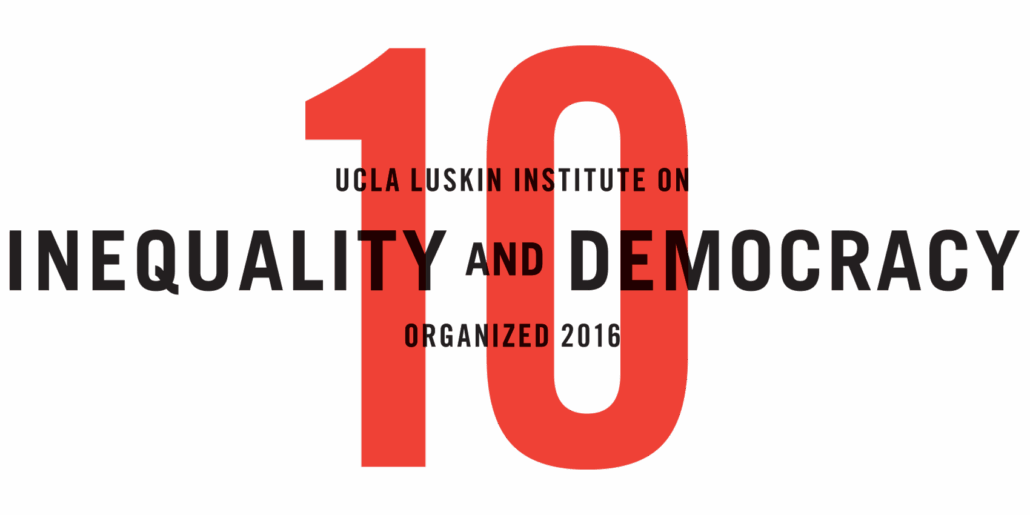Reflections on China and Urban Planning by a UCLA Legend
UCLA Luskin Institute on Inequality and Democracy Distinguished Lecture Series with John Friedmann
By George Foulsham
For John Friedmann, his recent visit to the UCLA Luskin School of Public Affairs offered an opportunity to renew ties with some of his former colleagues and many friends. For Luskin students, faculty, staff and alumni, it was a chance to welcome, embrace, honor and learn from a legend in urban planning.
“Though John Friedmann does not need an introduction to this audience, I will nevertheless use this opportunity to remind us of his legendary presence and influence in urban planning and more broadly in the spatially oriented social sciences,” said Ananya Roy, director of the UCLA Luskin Institute on Inequality and Democracy, as she prepared to introduce the 90-year-old Friedmann as the institute’s first distinguished lecturer. “To have him here is very special.”
Roy went on to list some of Friedmann’s accomplishments and honors:
- In the 1960s, he was one of the founders of the UCLA Urban Planning program, now a department within the Luskin School. “For several decades, the program was synonymous with John Friedmann,” Roy said.
- A professor emeritus at the University of British Columbia, Friedmann’s books, including “Planning in the Public Domain: From Knowledge to Action,” are classics, Roy said. “For those of us who were trained at other urban planning programs, we were raised on the writings of John Friedmann,” she said. “His scholarship, for example, the analysis of world city formation, remains foundational to the ways in which we think about cities and metropolitan regions around the world.”
- And he’s won many awards, including the Distinguished Educator Award presented by the Association of Collegiate Schools of Planning (ACSP). “There is also now a John Friedmann Book Award at ACSP,” Roy said.
During his lecture, “The Ruse of Reason: Poverty, Inequality and Personal Freedoms in the People’s Republic of China 1950-2015,” Friedmann covered the 65 years that the Chinese Communist Party (CCP) has been in power.
“I’ve chosen this theme in part because, as Ananya Roy has reminded, poverty and inequality in life are best understood in the context of a given territory, a city, a region,” Friedmann said. “But, above all, I focus on China because in a world historical perspective, the peaceful rise of this vast country is the central story of the last century.”
Friedmann reeled off a list of impressive accomplishments by the Chinese government over the past 65 years. The CCP has:
Lifted hundreds of millions of peasant farmers out of poverty.
Achieved its transition to an urban society, rising from 12 percent at the beginning of the period to more than 50 percent at present, while planning to urbanize another 300 million within the next two or three decades.
Achieved home ownership for more than 75 percent of residents of urban households, excluding migrant workers.
Lengthened the average lifespan to more than 75 years.
Abolished illiteracy, making nine years of education compulsory and enrolling 12 million students in postsecondary education.
“As a result, the People’s Republic of China stands on the threshold of becoming a global power,” Friedmann said.
But the statistics mask a much more troubling trend in China. Friedmann viewed the 65 years through the lens of three political cycles, taking listeners back to when Mao Tse-tung assumed control of the country.
“Mao has unified China and now embarks on a collectivist experiment,” Friedmann said of that time. “People are guaranteed a basic livelihood and equality is achieved. But the costs are enormous. Personal freedoms are suppressed. In comparison to east Asia and western Europe, China’s economy remains economically and technically backward. The egalitarian experiment has failed.”
In the second cycle, initiated by Deng Xiaoping, “the state promotes economic growth as the first priority,” Friedmann said. “China becomes a producer for world markets — by the end of the cycle, second only to the United States in total production. But the costs incurred are heavy. China ranks among the group of countries with the highest indices of income inequality worldwide.
“Serious damage continues to be done to the collective resources of air, water and land, endangering peoples’ health and well-being,” he added. “An insipient class system emerges.” Middle-income sectors are the principle beneficiaries of public policy and the enjoyment of personal freedoms extends disproportionately in comparison to the indigent population, which remains statistically significant.
“The masses of the working poor have little to cheer about,” Friedmann said. “As for political freedoms, even the topic remains off-limits for discussion.”

John Friedmann (Photo by Roberto Gudino)
The challenges left behind by the two previous cycles have now been passed on to a new generation of leaders headed by Xi Jinping, who has launched the third political cycle of CCP rule under severe economic restraints, even as the country attempts to position itself as a global leader.
“Each of the two cycles I have sketched lasted for about 30 years,” Friedmann said. “Each begins with a powerful vision, the egalitarian utopia of the classless society, the heady promise of the socialist market economy, and ends with a sense of profound disappointment. Even our best intentions tend to fall short of their initial promise. And yet, we continue to try, perhaps as the poor Samuel Beckett said, next time to fail better.”
Before his lecture, Friedmann reflected on his time at UCLA as a founder and as the chair of Urban Planning for 14 years.
“I rather enjoyed being in that leadership role,” he said. “The vision that I had was that planning at the local level was not just a profession. Urban planning is a concept that is not all that clear and encompasses larger and larger areas. I transitioned from rural, perhaps, to a more urban set of functions.
“We wanted to recruit a faculty who would also be very scholarly and would engage in research to bring this forward. Today, this seems obvious, but it wasn’t obvious then.”
Friedmann arrived at UCLA in 1969 and he smiles when asked what he thinks about how Urban Planning has blossomed into a strong, influential department within the Luskin School of Public Affairs.
“I’m pleased to see that the Urban Planning program, now department, is flourishing in so many different ways and the research function has been expanded,” he said. “There are so many centers here in planning or related to planning. I am very happy to see this strong profile that you have and wish that it would continue forever.”
Source: luskin.ucla.edu



